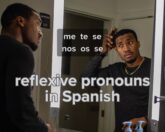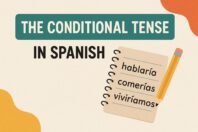Past Perfect Subjunctive In Spanish: A Simple Guide

Get our free email course, Shortcut to Conversational.
Have conversations faster, understand people when they speak fast, and other tested tips to learn faster.
More infoThe past perfect subjunctive Spanish or pluperfect subjunctive (el pluscuamperfecto de subjuntivo) is a mood that us native speakers use to talk about hypothetical situations that are related to the past.
In other words, this mood describes an action that could have occurred in the past – but in reality, it never happened.
Before we continue, it’s important to clarify what the subjunctive mood is.
You may have noticed that we refer to the subjunctive as a mood, rather than a tense.
That’s because the subjunctive is one of three moods that exist in Spanish – along with the imperative and interrogative moods.
The subjunctive mood is used when the speaker wants to indicate uncertainty.
This means that it is typically preceded by verbs that express doubt, uncertainty, feelings, opinions – or within an “if” clause.
More specifically, the past perfect subjunctive is used when we want to speak about regrets or hindsight, in relation to an action that should have been done – but never was.
Now you have a basic understanding of this mood, we can learn how to conjugate this mood.
(PS, make sure to read our explanation of all six Spanish subjunctive forms here)
How To Conjugate Past Perfect Subjunctive Spanish
Any Spanish grammar structure that includes the word “perfect” will use a similar formula when it comes to conjugation.
- The auxiliary verb “haber” + the past participle.
To conjugate in past perfect subjunctive, the auxiliary verb “haber” will be conjugated in the imperfect subjunctive form, along with the past participle.
This gives us the following formula:
- Haber (Hubiera / Hubiese) + Past Participle
For example:
- I wish I had studied more – Ojalá hubiera / hubiese estudiado más.
Notice that this can also be used with if clauses in order to express conditional sentences while using this subjunctive form.
- If I had studied – Si hubiera/hubiese estudiado.
The complete conjugation according to personal pronouns will look like this:
| Personal pronoun | Pluperfect Subjunctive
Haber (To have) |
Past Participle Comer (To eat) |
| Yo | Hubiera / Hubiese | Comido |
| Tú | Hubieras / Hubieses | Comido |
| Él / Ella | Hubiera / Hubiese | Comido |
| Usted | Hubiera / Hubiese | Comido |
| Nosotros | Hubiéramos / Hubiésemos | Comido |
| Ustedes | Hubieran / Hubiesen | Comido |
| Ellos / Ellas | Hubieran / Hubiesen | Comido |
Important: As you can see, the auxiliary verb “haber” is conjugated in the imperfect subjunctive, which has two different conjugations. The good news is that both mean the exact same thing, and so you use them interchangeably without changing the meaning.
Once you use this haber conjugation, simply add the past participle of the action verb.
Now let’s take a look at some example sentences using the past perfect subjunctive mood.
- It was possible that he had arrived late – Era posible que él hubiera / hubiese llegado tarde
- You wouldn’t have so many problems if you had told the truth – No tendrías tantos problemas si hubieras / hubieses dicho la verdad
- I wish you had learned Spanish – Ojalá hubieras / hubieses aprendido español
- I don’t think you would have traveled with me last year – No creo que hubieras / hubieses viajado conmigo el año pasado
- If I had had a million dollars, I would have bought that mansion last year – Si hubiera / hubiese tenido un millón de dólares, habría comprado esa mansión el año pasado
Past Perfect Subjunctive Spanish Exercises
Test your understanding of the Past Perfect Subjunctive by adding the correct conjugation to the below sentences.
(scroll down for the answers)
1. Haber/Decir
No le _____ _____ la verdad
(I wouldn’t have told him the truth)
2. Haber / Estudiar
Si _____ _____ , no estaríamos preocupados por el exámen
(If we had studied, we would not be worried about the exam)
3. Haber / Ir
Nos _____ _____ a la playa contigo, pero teníamos que trabajar
(We would have gone to the beach with you, but we had to work)
4. Haber/ gustar
Me _____ _____ probar esa torta de chocolate
( I would have liked to taste that chocolate cake)
5. Haber / hacer
¿Qué _____ _____ diferente en tu vida?
(What would you have done differently in your life?)
6. Haber / Graduarse
Si no te _____ _____ de veterinaria, ¿qué estarías haciendo?
(If you had not graduated as a veterinarian, what would you be doing?)
7. Haber / Poder
_____ _____ reservar con tiempo una mesa en el restaurante
(You could have set aside a table in the restaurant in time)
8. Haber / hacer
No creo que _____ _____ algo así.
(I do not think you would have done something like that)
9. Haber / Ir
Yo hubiera ido al concierto, pero no tenía dinero
(I would have gone to the concert, but I had no money)
10. Haber / Acompañar
Te _____ _____ a hacer ejercicios, pero era muy temprano para mí.
(I would have accompanied you to do exercises, but it was too early for me)
Answers
1. No le hubiera/hubiese dicho la verdad
2. Si hubiéramos/hubiésemos estudiado, no estaríamos preocupados por el exámen
3. Nos hubiéramos/hubiésemos ido a la playa contigo, pero tenía que trabajar
4. Me hubiera/hubiese gustado probar esa torta de chocolate
5. ¿Qué hubieras/hubieses hecho diferente en tu vida?
6. Si no te hubieras/hubieses graduado de veterinaria, ¿qué estarías haciendo?
7. Hubieras/Hubieses podido reservar con tiempo una mesa en el restaurante
8. No creo que hubieras/hubieses hecho algo así
9. Yo hubiera/hubiese ido al concierto, pero no tenía dinero
10. Te hubiera/hubiese acompañado a hacer ejercicios, pero era muy temprano para mí



